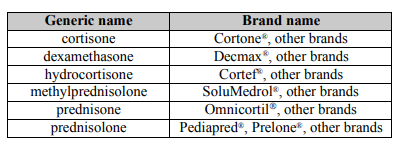
How does this medicine work?
Corticosteroids are hormones made in the adrenal glands to help the body respond to stress, such as injury or illness. They are not the same steroids that some athletes have misused to increase muscle mass and strength.
Corticosteroids are given to reduce the function of cancer cells. They also help other chemotherapy medicines work better.
How should I give it?
Corticosteroids can be given by mouth as a pill or liquid, or by injection into the muscle or vein. Give it at regular times to keep a steady level in the bloodstream.
Your child should be awake and alert when taking any medicine. Follow the checked instructions below:
If using the liquid form, shake well right before using. Draw up the correct amount in the medicine dropper or oral syringe. Give a small squirt of the medicine inside the cheek. To avoid choking, let your child swallow each squirt before giving more.
For babies, mix the medicine with a small amount of formula or breast milk and give it with a bottle nipple before a feeding. Do not add medicine to a whole bottle because if your baby does not finish it, you will not know how much of the medicine was taken.
For children who cannot swallow pills:
- Crush the tablet in a tablet crusher or between 2 spoons inside a clear plastic bag.
- Mix the powder with a very small amount of soft food, such as applesauce, chocolate syrup, ice cream, jelly, or yogurt. Make sure your child takes all of the mixture.
Other instructions:
Are there any precautions about food or other medicines?
Give it with food or milk to prevent an upset stomach.
If your child will be taking corticosteroids for more than a month, see the education sheet “Corticosteroids and nutrition” to prevent some side effects.
Check with the doctor, nurse practitioner or pharmacist if taking any other medicines, vitamins, herbal products, or over-the- counter medicines.
What should I do if a dose is missed?
If one dose is missed, give it as soon as you remember, unless it is less than 6 hours before the next dose. In that case, skip the missed dose and go back to the regular dosing schedule. Never give a double dose.
If your child vomits (throws up) within 30 minutes after receiving a dose, give it again. If your child vomits after 30 minutes, do not repeat the dose.
Call the doctor if your child misses or vomits 2 doses in a row.
What are the side effects?
Most side effects occur with high doses and long treatment, and end when the medicine is stopped. They may include:
